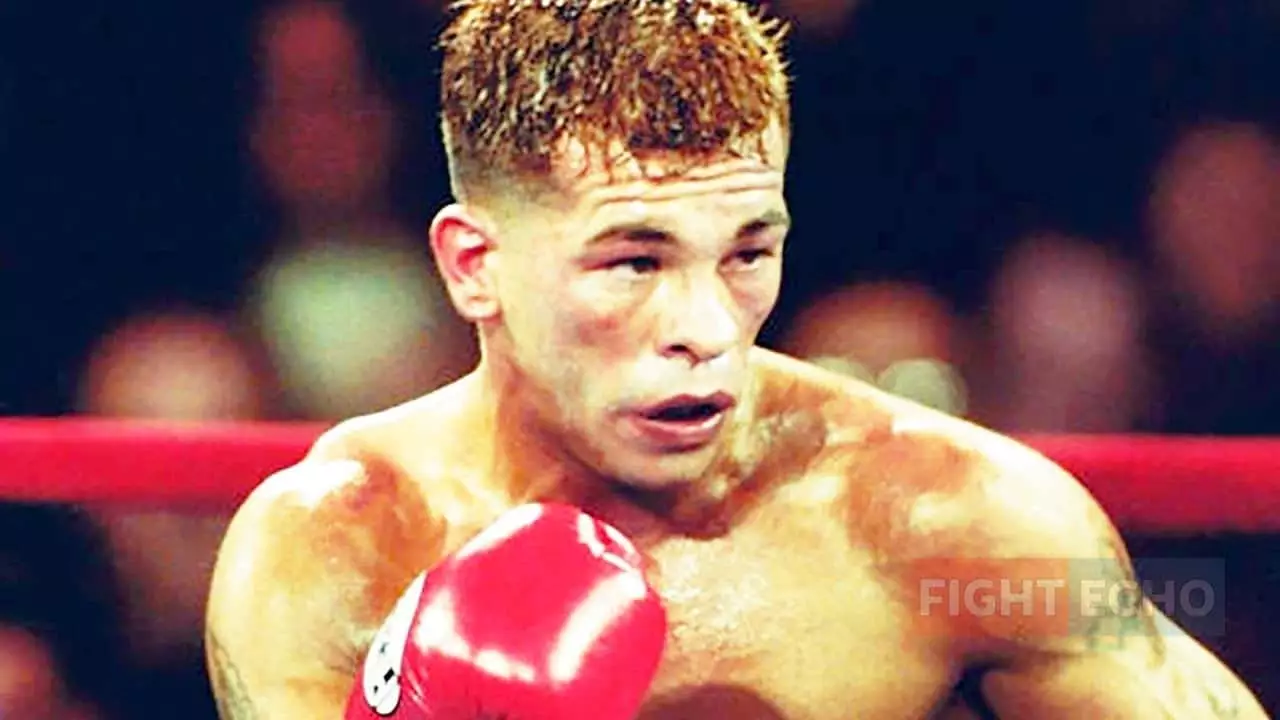The date was June 25, 2005, and the atmosphere at Boardwalk Hall was electric with anticipation. Fans came to see Arturo Gatti, a fighter whose fierce determination and relentless heart made him a beloved figure in boxing. Nicknamed “Thunder,” Gatti was revered for his brawls, which often resembled brutal symphonies of courage and grit. Conversely, in the opposite corner stood Floyd Mayweather, known more for his precision and technical mastery than for thrilling exchanges. Dubbed “Pretty Boy” before his evolution into “Money,” Mayweather was introducing boxing enthusiasts to a style so effective it often left his opponents looking not just defeated, but bewildered.
What many expected to be an epic clash of titans turned into a masterclass of tactical brilliance, leaving Gatti’s legion of fans heartbroken. By the time the bout was paused in the sixth round, those who entered with hopes of witnessing a fierce war were left to grapple with the disheartening reality of boxing: not all matchups deliver the drama they promise.
A Lesson in Speed and Technique
From the opening bell, the match’s trajectory became clear. Mayweather’s hands, as swift and precise as lightning, carved through Gatti’s defenses with ease. His speed was not merely a physical gift but a tactical weapon. Mayweather moved seamlessly, often evading punches while countering with such efficiency that Gatti found himself outmatched at almost every turn. The bout wasn’t just one-sided; it was a showcase of what happens when raw skill collides with strategy.
To dissect Gatti’s performance is to highlight a fighter no longer able to find his rhythm against an opponent who epitomized a new wave of boxing. With every punch thrown, Mayweather proved that frenetic energy could be eclipsed by calculated movements. Gatti appeared to struggle, resorting to fundamental mistakes common among novices, like dropping his hands and looking away, a moment that resulted in a left hook that sent him crashing to the canvas. This was not simply a testament to Gatti’s style but an indictment on the different levels at which these two fighters operated that night.
Statistics Don’t Lie
The fight statistics revealed the chasm between the two boxers. Mayweather landed a jaw-dropping 168 punches to Gatti’s 41, a staggering difference that underlined the former’s dominance in the ring. Such numbers paint a bleak picture for Gatti, a fighter who had, until then, carved out a legacy based on triumph against adversity and taking a multitude of punches to deliver his own. It was surreal to witness the transformation of a celebrated warrior into a shell of his former self, rendered helpless against a technician working with pinpoint efficiency.
The statistics seemed almost cruel; they reflected a boxing truth—at any given moment, a fighter’s whole reputation can hinge on a single bout. Gatti had long since been defined by his ability to claw victory from defeat, but in this match, even his legendary resilience couldn’t save him from the calculated barrage inflicted by Mayweather.
A Decision Rooted in Respect
Buddy McGirt, Gatti’s trainer, made the tough decision to pull Gatti out of the fight, a move born from love and respect for his boxer. Watching someone you care for endure such punishment serves as a crushing reminder of the violent nature of boxing. McGirt grasped that allowing Gatti to continue would serve no purpose other than risking further damage to his fighter’s health and legacy.
Within the sport, this decision is frequently debated, raising the question of where the line is drawn between a fighter’s indomitable spirit and their safety. Mayweather, post-fight, extended an apology for his earlier words labeling Gatti a “club fighter.” This was not merely an apology; it was a reflective acknowledgment of the gulf that had been exposed that night. No longer could Gatti be positioned on the same pedestal as Mayweather; the fight flatly illustrated that stark reality.
The Aftermath of a Masterclass
In the aftermath, Mayweather solidified his position as one of the sport’s greatest, a dual existence as both an untouchable champion and a controversial figure for occasionally diminishing the spectacle of boxing into a strategic dance. Conversely, Gatti, despite the loss, continued to embody resilience and heart, the traits that endeared him to millions.
Ultimately, this bout serves as a poignant reminder that in the sporting arena, the line between glory and defeat is rarely straight. Gatti’s legacy remained intact, a testament to the spirit of fighting against seemingly insurmountable odds, even if that night belonged to Floyd Mayweather—a masterclass, yes, but a painful spectacle for those who adored “Thunder.”

